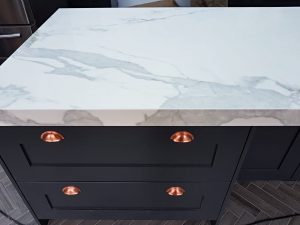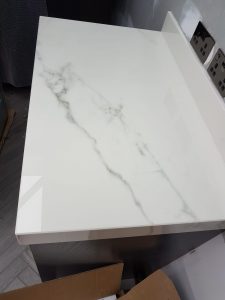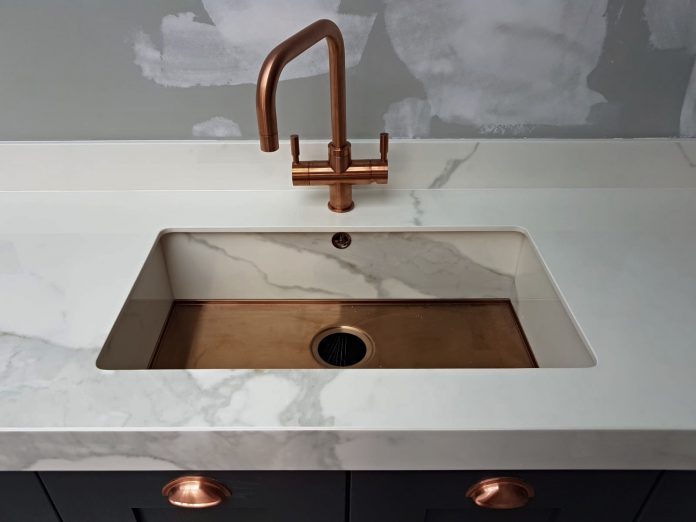Ceramic Worktops – what you need to know:
The variety of materials used for kitchen worktops offers a wide range of choices. We have already written about the advantages and disadvantages of a stone tops and conglomerate tops. Today, the main character of this post will focus on ceramic worktops.
Ceramic worktops – what are they?
Upon hearing the term ‘ceramic worktop’, many people imagine a kitchen worktop made of ceramic tiles. Meanwhile, the term ceramic worktop is actually another term for a material also called by sintered stone or sintered quartz.
It is a worktop made of various components:
- minerals that originate from quartz,
- minerals from glass and silica,
- oxides that affect the colour properties of the product.
In the production process, these components are combined using sintering technology at temperatures over 1200°C and under pressure of 25,000 tonnes. The result is a monolithic plate with an unprecedented durability.
Ceramic worktops – advantages
Among the most important advantages of ceramic worktops, it is worth mentioning its extraordinary durability. It is harder and more durable than granite, and at the same time much lighter than granite. Other advantages that are worth mentioning are:
- resistance to high temperatures, frost, scratches, impacts, bending,
- UV resistance and high colour stability,
- hygiene – can be used in contact with food,
- easy to clean – ceramic worktops do not absorb liquids at all,
- possibility to produce plates of very large sizes and different thicknesses (standard 3, 6, 12 mm),
- elegance – important manufacturers, such as Dekton or Neolith, offer a choice of several colour variants in collections of various styles.
Such properties make this material can be used not only as a ceramic worktop for kitchens, but also in the form of wall or floor linings, even in public places.
Ceramic worktops for kitchens – disadvantages
Seeing so many advantages, you might wonder if the quartz sintered top has any disadvantages. For many people, the main disadvantage may be the price. A ceramic worktop is certainly much more expensive than cheap chipboard worktops, but its price is comparable to that of granite or conglomerate worktops. Faced with the dilemma of which worktop to choose for the kitchen, it is worth bearing this in mind.
Ceramic table top or table top made of stone?
Finally, we would like to add a few words about the similarities and differences between the ceramic top and the stone and conglomerate top. Ceramic worktops are definitely lighter than granite. It is also more durable and more pleasant to read.
It is available in different colors, although there is no such possibility to dye it as in the case of countertops made of conglomerate. However, it has better color stability and, unlike conglomerate worktops, it is resistant to UV rays.
Despite the predominant number of advantages that quartz sintered tops have, it cannot be unequivocally said that this top is always the best solution. It very much depends on individual preferences and the style of the kitchen.
Do you want to quickly find out whether your desired ceramic worktops are worth the price? Visit this website to complete a quick online quote for your ceramic worktop. It takes roughly 5 minutes to complete, and the price provided at the end is very reliable. The best feature is that you can experiment with varied ceramic colours – thus far only Neolith is available, but when I contacted the company, they expressed that Dekton and Lapitec will soon be featured in the selection process. If you have any further doubts about ceramic worktops cost and how much they sell for, visit this blog entry. I found it recently when browsing the internet and must say the writer specifies in a nutshell why the prices for ceramic worktops are steeper, but also why they are worth every penny.
If by any chance this article hasn’t yet persuaded you that ceramic worktops are the way to go, feel free to read through my other blog here. I describe in the post why stone worktops are the way to go and why the given price is wholly justified.

